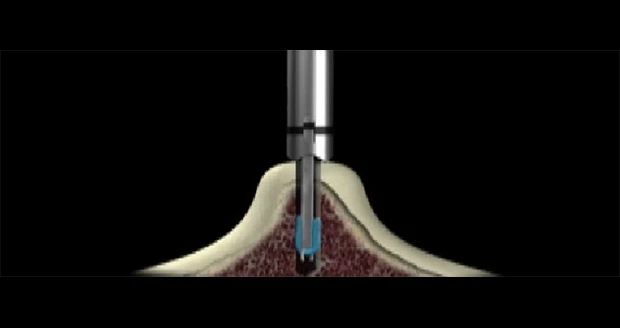
Warsaw, Indiana – Officials from Biomet Sports Medicine LLC, a subsidiary of Biomet Inc. announce the launch of the JuggerKnotless Soft Anchor device. The JuggerKnotless Soft Anchor is the latest product offering in the JuggerKnot Soft Anchor family of all-suture implants, securing its position as a leader in all-suture anchor technology.
This product, which may be utilized for labral repair surgery in the shoulder, is the first all-suture, knotless device on the market. Knotless anchor technology, which allows surgeons to secure soft tissue without the use of surgical knots, represents a large and growing segment of the sports medicine shoulder market. By combining all-suture and knotless technologies, Biomet Sports Medicine is creating a new market segment, as it did four years ago with the launch of the JuggerKnot Soft Anchor Device.
“Biomet has a strong and proven tradition of developing state-of-the-art products like the JuggerKnot Soft Anchor,” says Dean Trippiedi, vice president and general manager of Biomet Sports Medicine. “The JuggerKnotless builds on this tradition by bringing together Biomet Sports Medicine’s all-suture and adjustable loop technologies to provide surgeons with the unique ability to control the tension of the soft tissue repair. This product is a representation of our continued focus on providing valuable product innovation that supports surgeons and the patients they serve.”
The JuggerKnotless Soft Anchor features:
- The benefits of all-suture anchor technology, which eliminates the use of a hard implant that can fracture and cause loose bodies in the joint.
- A small, 2.1mm drill hole that preserves bone and allows more freedom in anchor placement.
- Unique technology that provides the surgeon with the ability to control the tension of the construct without tying a surgical knot.
Source: Biomet
Latest from Today's Medical Developments
- IMTS 2026 runs Sept. 14-19 at McCormick Place in Chicago, Illinois
- Master Bond’s MasterSil 800Med
- ZEISS celebrates 100 years of advancing innovation in the US
- Teleflex sells acute care and urology businesses for $2.03 billion
- HANNOVER MESSE: Where research and manufacturing meet
- What’s next for the design and manufacturing industry in 2026?
- Arcline to sell Medical Manufacturing Technologies to Perimeter Solutions
- Decline in German machine tool orders bottoming out





